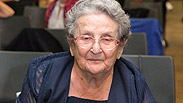
Juta Hartman
Juta Hartman, one of the last surviving fighters of the Warsaw Ghetto Uprising during WWII, passed away Wednesday morning at the age of 92. "For her whole life, what she had in her mind was to tell the truth about the Warsaw Ghetto Uprising," said her grandchild. For years, the story of the Jewish Military Organization in Warsaw went untold until just the last few years, thanks, in part, to Hartman.
There, Hartman joined the ranks of the Jewish Military Organization, the first organized resistance group in the Ghetto led by 23-year-old Paweł Frenkiel. The organization's vast armament allowed it to manage the fight with determination throughout the uprising, which took place at Muranowski Square where the fighters erected two flags - that of Poland and of the Zionists. For four days, determined attacks by the Nazis failed to capture the flags.
Hartman was born in the city of Kielce in Poland to a traditional Jewish family. After the Nazi invasion and the creation of the Kielce Ghetto, Hartman was forced to put herself in danger by climbing over the walls to look for food for her family. During one fateful outing, she was caught by the Nazis, but managed to slip away, escaping to the Warsaw Ghetto.
Moral Victory
Associated Press
Two days before her comrades embarked on act of Jewish resistance, Aliza Mendel was ordered to 'leave and tell the world how we died fighting the Nazis.' She has been doing that ever since
Juta served as a radioman in the organization and was responsible for the smuggling operations that brought weapons into the Ghetto. Hartman exited the Ghetto through the sewer systems and returned with weapons hidden in double-bottomed buckets covered with rotting fish. With the outbreak of the uprising in 1943, Juta was on the roof of one of the buildings and saw the Zionist flag flying above the Ghetto.
After the war, Juta married and had two sons. She became a grandmother with six grandsons and five granddaughters. "There were several underground organizations," said her grandson. "But everyone only hears about the Jewish Combat Organization of Mordechai Anielewicz, who did amazing work and he is an Israeli hero through and through. The story of the Jewish Military Organization however, wasn't told and that's only because of political reasons of ego, prestige, and politics."
The grandchildren explain that the Jewish Military Organization indentified with the political right and for many years the memory of the uprising was thrown under the country's (Israel's) first ruling party, Mapai.
"There has been evidence throughout the years that the Jewish Military Organization under Paweł Frenkiel set the tone the highest during the Warsaw Ghetto Uprising," added Hartman's grandchildren. "When Israel was created, Holocaust survivors didn't talk about what they'd gone through, of course, because they were busy building the nation. In the days of the Mapai government, all the actions of the Jewish Military Organization were silenced, and its most daring feats weren't honored or recognized for decades."
"A little recognition began in the 60s with the publishing of the book 'Masada of Warsaw' by Chaim Lazar and in 2000 when Defense Minister and former Foreign Minister Moshe Arens published the book 'Flags Over the Warsaw Ghetto'. Textbooks and history books didn't mention the organization for years - wrongs that have been slightly amended recently."
Yuval Haimovich-Zuser, the director who guided Juta for the last four years to make the film "The Warsaw Ghetto Uprising: The Untold Story", said, "Her (Hartman's) story only gained recognition in the last few years. I visited her in the hospital on Friday where she was hospitalized unexpectedly, and she was still smiling. Now that she's passed, there are no fighters left who can tell these stories. I never met such an Israeli hero. After our first meeting I was captivated by her charm."
"She was a person with mental strength; only such people could fight and survive, build a family here and start everything anew with a smile and optimism. Since my first meeting with her she became a grandmother to me and the entire team."
In the movie, Juta addressed the ignorance of the Jewish Military Organization saying, "They didn't want to hear me. I ran from door to door and I was afraid that soon I would die, but no one wanted to hear. This hurt me for so many years. It's hard to say that with all the attention today, but the wound remains."
She was honored three years ago when she was chosen to light a torch at a rally on Holocaust Day at the Ghetto Fighters Museum and five years ago, 67 years after she went up on the roofs of the Ghetto with grenades, she became an honorary citizen of Warsaw.
"We will remember her as a fighter who characterized by her love for people, love for Israel, and lots of giving," said her grandchildren. "Later, she made sure to support the bereaved families and help treat wounded soldiers in Israel's wars; she volunteered with Magen David Adom during the Yom Kippur War."















